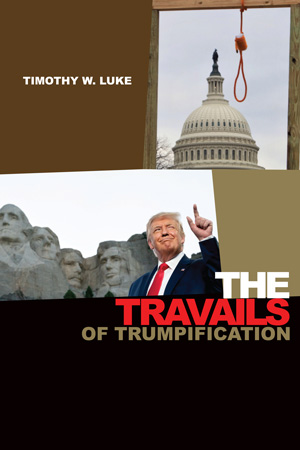Save 20% on the paperback edition of The Travails of Trumpification by purchasing it in our online store and using the coupon code BOOKS20 during checkout.
 The disagreement about the propriety of the FBI’s search of Donald Trump’s residence reveals a fundamental divide over the proper role of the federal government. On the one hand, the defenders of the search have emphasized the rule of law and the idea that no one should stand above the law. From this perspective, Trump represents a danger to democracy itself, which the federal government is defending. On the other hand, for Trump supporters the search epitomizes the all-encompassing reach of the federal government into people’s daily lives and thus a further example of the erosion of freedom in the United States. The uncomprehending attitude of each side toward the other exemplifies the ways in which “the travails of Trumpification,” as described by Tim Luke, do not represent a passing phenomenon. As three recent reviews of Luke’s book emphasize, Trumpism is a complex phenomenon that is not just about Donald Trump. Populism predates Trump’s rise by more than a century, and the motivating attitudes and ideas will surely continue to shape American politics after he is gone. The focus on Trump the man has led, for both supporters (not least Trump himself) and detractors, to a failure to address the broader currents that he has been able to mobilize.
The disagreement about the propriety of the FBI’s search of Donald Trump’s residence reveals a fundamental divide over the proper role of the federal government. On the one hand, the defenders of the search have emphasized the rule of law and the idea that no one should stand above the law. From this perspective, Trump represents a danger to democracy itself, which the federal government is defending. On the other hand, for Trump supporters the search epitomizes the all-encompassing reach of the federal government into people’s daily lives and thus a further example of the erosion of freedom in the United States. The uncomprehending attitude of each side toward the other exemplifies the ways in which “the travails of Trumpification,” as described by Tim Luke, do not represent a passing phenomenon. As three recent reviews of Luke’s book emphasize, Trumpism is a complex phenomenon that is not just about Donald Trump. Populism predates Trump’s rise by more than a century, and the motivating attitudes and ideas will surely continue to shape American politics after he is gone. The focus on Trump the man has led, for both supporters (not least Trump himself) and detractors, to a failure to address the broader currents that he has been able to mobilize.
Unfortunately for Trumpism, the obsession with Trump himself has obscured the real problems at stake in its realignment of American politics. In returning us to the issues of the 1896 and 1912 elections, Trumpism has retrieved a populism that cannot be reduced to a simple narrative of a backlash against the loss of white privilege. While one of Trump’s key faults has been his undermining of liberal democratic procedures, Trumpism also includes a critique of managerial bureaucracy that needs to be seriously addressed. If William Jennings Bryan could raise in 1896 the specter of “an office-holding class,” the rise of a managerial business and government elite since then has created a class division replacing a rich vs. poor dichotomy with a “new class” vs. populist one.
Key to this problem is the structure of the welfare state that expands government programs that replace forms of mutual aid (highlighted in Telos 198) and increase the government management of everyday life without, however, having demonstrated any success in breaking cycles of poverty. While the left attributes continuing poverty to “systemic racism,” this term obfuscates the true nature of the problem, as it describes policies whose effects vary by race, not by design, but due to disparities between different populations. If the use of credit scores for mortgages or standardized test scores for college admissions leads to variations by race in success rates, such racial disparities are not necessarily an indication of a racism that is built into the system, and the solution would not be to shoot the messenger by abandoning the systems of credit score reporting or standardized testing but to investigate the underlying causes of such disparities. The charge of systemic racism deflects critique of the welfare state by blaming its failures on continuing racism when the problem may stem from the unintended consequences of welfare state policies themselves (I investigate this question in my essay, “Economy and Ecology: Federal Populism and the Devil in the Details of Universal Basic Income,” in Telos 191). Meanwhile, the inability to address the failure of welfare state policies that have mired historically disadvantaged populations in poverty has resulted in the continuation of forms of racial bias as well as populism’s undifferentiated resentment against the federal government, including those aspects that deserve support and respect. Where the left sees everything through the lens of racism, the right sees everything as evidence of government control of people’s lives. Such an inability on both sides to see past their own perspectives is perhaps the main underlying cause for the abiding travails of Trumpification.



